- Home
- Paulo Coelho
Witch of Portobello Page 8
Witch of Portobello Read online
Page 8
She nodded.
“And although you have mastered the words, you haven’t yet mastered the blank spaces. When you’re concentrating, your hand is perfect, but when it jumps from one word to the next, it gets lost.”
“How do you know that?”
“Am I right?”
“Absolutely. Before I focus on the next word, for a fraction of a second I lose myself. Things I don’t want to think about take over.”
“And you know exactly what those things are.”
Athena knew, but she said nothing until we went back to the tent and she could cradle her sleeping son in her arms. Her eyes were full of tears, although she was trying hard to control herself.
“The emir said that you were going on holiday.”
She opened the car door, put the key in the ignition, and started the engine. For a few moments, only the noise of the engine troubled the silence of the desert.
“I know what you mean,” she said at last. “When I write, when I dance, I’m guided by the Hand that created everything. When I look at Viorel sleeping, I know that he knows he’s the fruit of my love for his father, even though I haven’t seen his father for more than a year. But I…”
She fell silent again. Her silence was the blank space between the words.
“…but I don’t know the hand that first rocked me in the cradle. The hand that wrote me in the book of the world.”
I merely nodded.
“Do you think that matters?”
“Not necessarily. But in your case, until you touch that hand, your, shall we say, calligraphy will not improve.”
“I don’t see why I should bother to look for someone who never took the trouble to love me.”
She closed the car door, smiled, and drove off. Despite her last words, I knew what her next step would be.
SAMIRA R. KHALIL, ATHENA’S MOTHER
It was as if all her professional success, her ability to earn money, her joy at having found a new love, her contentment when she played with her son—my grandson—had all been relegated to second place. I was quite simply terrified when Sherine told me that she’d decided to go in search of her birth mother.
At first, of course, I took consolation in the thought that the adoption center would no longer exist, the paperwork would all have been lost, any officials she encountered would prove implacable, the recent collapse of the Romanian government would make travel impossible, and the womb that bore her would long since have vanished. This, however, provided only a momentary consolation: my daughter was capable of anything and would overcome seemingly impossible obstacles.
Up until then, the subject had been taboo in the family. Sherine knew she was adopted, because the psychiatrist in Beirut had advised me to tell her as soon as she was old enough to understand. But she had never shown any desire to know where she had come from. Her home had been Beirut, when it was still our home.
The adopted son of a friend of mine had committed suicide at the age of sixteen when he acquired a biological sister, and so we had never attempted to have more children of our own, and we did everything we could to make her feel that she was the sole reason for our joys and sadnesses, our love and our hopes. And yet it seemed that none of this counted. Dear God, how ungrateful children can be!
Knowing my daughter as I did, I realized that there was no point in arguing with her about this. My husband and I didn’t sleep for a whole week, and every morning, every evening, we were bombarded with the same question: “Whereabouts in Romania was I born?” To make matters worse, Viorel kept crying, as if he understood what was going on.
I decided to consult a psychiatrist again. I asked why a young woman who had everything in life should always be so dissatisfied.
“We all want to know where we came from,” he said. “On the philosophical level that’s the fundamental question for all human beings. In your daughter’s case, I think it’s perfectly reasonable that she should want to go in search of her roots. Wouldn’t you be curious to know?”
“No, I wouldn’t. On the contrary, I’d think it dangerous to go in search of someone who had denied and rejected me when I was still too helpless to survive on my own.”
But the psychiatrist insisted: “Rather than getting into a confrontation with her, try to help. Perhaps when she sees that it’s no longer a problem for you, she’ll give up. The year she spent far from her friends must have created a sense of emotional need, which she’s now trying to make up for by provoking you like this. She simply wants to be sure that she’s loved.”
It would have been better if Sherine had gone to the psychiatrist herself, then she would have understood the reasons for her behavior.
“Show that you’re confident and don’t see this as a threat. And if, in the end, she really does go ahead with it, simply give her the information she needs. As I understand it, she’s always been a difficult child. Perhaps she’ll emerge from this search a stronger person.”
I asked if the psychiatrist had any children. He didn’t, and I knew then that he wasn’t the right person to advise me.
That night, when we were sitting in front of the TV, Sherine returned to the subject.
“What are you watching?”
“The news.”
“What for?”
“To find out what’s going on in Lebanon,” replied my husband.
I saw the trap, but it was too late. Sherine immediately pounced on this opening.
“You see, you’re curious to know what’s going on in the country where you were born. You’re settled in England, you have friends, Dad earns plenty of money, you’ve got security, and yet you still buy Lebanese newspapers. You channel-hop until you find a bit of news to do with Beirut. You imagine the future as if it were the past, not realizing that the war will never end. What I mean is that if you’re not in touch with your roots, you feel as if you’ve lost touch with the world. Is it so very hard then for you to understand what I’m feeling?”
“You’re our daughter.”
“And proud to be. And I’ll always be your daughter. Please don’t doubt my love or my gratitude for everything you’ve done for me. All I’m asking is to be given the chance to visit the place where I was born and perhaps ask my birth mother why she abandoned me or perhaps, when I look into her eyes, simply say nothing. If I don’t at least try and do that, I’ll feel like a coward and I won’t ever understand the blank spaces.”
“The blank spaces?”
“I learned calligraphy while I was in Dubai. I dance whenever I can, but music only exists because the pauses exist, and sentences only exist because the blank spaces exist. When I’m doing something, I feel complete, but no one can keep active twenty-four hours a day. As soon as I stop, I feel there’s something lacking. You’ve often said to me that I’m a naturally restless person, but I didn’t choose to be that way. I’d like to sit here quietly, watching television, but I can’t. My brain won’t stop. Sometimes I think I’m going mad. I need always to be dancing, writing, selling land, taking care of Viorel, or reading whatever I find to read. Do you think that’s normal?”
“Perhaps it’s just your temperament,” said my husband.
The conversation ended there, as it always ended, with Viorel crying, Sherine retreating into silence, and with me convinced that children never acknowledge what their parents have done for them. However, over breakfast the next day, it was my husband who brought the subject up again.
“A while ago, while you were in the Middle East, I looked into the possibility of going home to Beirut. I went to the street where we used to live. The house is no longer there, but despite the foreign occupation and the constant incursions, they are slowly rebuilding the country. I felt a sense of euphoria. Perhaps it was the moment to start all over again. And it was precisely that expression, ‘start all over again,’ that brought me back to reality. The time has passed when I could allow myself that luxury. Nowadays, I just want to go on doing what I’m doing, and I don’t need any new adventure
s.
“I sought out the people I used to enjoy a drink with after work. Most of them have left, and those who have stayed complain all the time about a constant feeling of insecurity. I walked past some of my old haunts, and I felt like a stranger, as if nothing there belonged to me anymore. The worst of it was that my dream of one day returning gradually disappeared when I found myself back in the city where I was born. Even so, I needed to make that visit. The songs of exile are still there in my heart, but I know now that I’ll never again live in Lebanon. In a way, the days I spent in Beirut helped me to a better understanding of the place where I live now, and to value each second that I spend in London.”
“What are you trying to tell me, Dad?”
“That you’re right. Perhaps it really would be best to understand those blank spaces. We can look after Viorel while you’re away.”
He went to the bedroom and returned with the yellow file containing the adoption papers. He gave them to Sherine, kissed her, and said it was time he went to work.
HERON RYAN, JOURNALIST
For a whole morning in 1990, all I could see from the sixth-floor window of the hotel was the main government building. A flag had just been placed on the roof, marking the exact spot where the megalomaniacal dictator had fled in a helicopter only to find death a few hours later at the hands of those he had oppressed for twenty-two years.
In his plan to create a capital that would rival Washington, Ceausescu had ordered all the old houses to be razed to the ground. Indeed, Bucharest had the dubious honor of being described as the city that had suffered the worst destruction outside of a war or a natural disaster.
The day I arrived, I attempted to go for a short walk with my interpreter, but in the streets I saw only poverty, bewilderment, and a sense that there was no future, no past, and no present: the people were living in a kind of limbo, with little idea of what was happening in their country or in the rest of the world. When I went back ten years later and saw the whole country rising up out of the ashes, I realized human beings can overcome any difficulty, and that the Romanian people were a fine example of just that.
But on that other gray morning, in the gray foyer of a gloomy hotel, all I was concerned about was whether my interpreter would manage to get a car and enough petrol so that I could carry out some final research for the BBC documentary I was working on. He was taking a very long time, and I was beginning to have my doubts. Would I have to go back to England having failed to achieve my goal? I’d already invested a significant amount of money in contracts with historians, in the script, in filming interviews, but before the BBC would sign the final contract, they insisted on me visiting Dracula’s castle to see what state it was in. The trip was costing more than I expected.
I tried phoning my girlfriend but was told I’d have to wait nearly an hour to get a line. My interpreter might arrive at any moment with the car and there was no time to lose, and so I decided not to risk waiting.
I asked around to see if I could buy an English newspaper, but there were none to be had. To take my mind off my anxiety, I started looking, as discreetly as I could, at the people around me drinking tea, possibly oblivious to everything that had happened the year before—popular uprisings, the cold-blooded murder of civilians in Timisoara, shoot-outs in the streets between the people and the dreaded secret service as the latter tried desperately to hold on to the power fast slipping from their grasp. I noticed a group of three Americans, an interesting-looking woman who was, however, glued to the fashion magazine she was reading, and some men sitting round a table, talking loudly in a language I couldn’t identify.
I was just about to get up yet again and go over to the entrance to see if my interpreter was anywhere to be seen, when she came in. She must have been a little more than twenty years old. She sat down, ordered some breakfast, and I noticed that she spoke English. None of the other men present appeared to notice her arrival, but the other woman interrupted her reading.
Perhaps because of my anxiety or because of the place, which was beginning to depress me, I plucked up my courage and went over to her.
“Excuse me, I don’t usually do this. I always think breakfast is the most private meal of the day.”
She smiled, told me her name, and I immediately felt wary. It had been too easy—she might be a prostitute. Her English, however, was perfect, and she was very discreetly dressed. I decided not to ask any questions and began talking at length about myself, noticing as I did so that the woman at the next table had put down her magazine and was listening to our conversation.
“I’m an independent producer working for the BBC in London, and, at the moment, I’m trying to find a way to get to Transylvania…”
I noticed the light in her eyes change.
“…so that I can finish the documentary I’m making about the myth of the vampire.”
I waited. This subject always aroused people’s curiosity, but she lost interest as soon as I mentioned the reason for my visit.
“You’ll just have to take the bus,” she said. “Although I doubt you’ll find what you’re looking for. If you want to know more about Dracula, read the book. The author never even visited Romania.”
“What about you, do you know Transylvania?”
“I don’t know.”
That was not an answer, perhaps it was because English—despite her British accent—was not her mother tongue.
“But I’m going there too,” she went on. “On the bus, of course.”
Judging by her clothes, she was not an adventuress who sets off round the world visiting exotic places. The idea that she might be a prostitute returned; perhaps she was trying to get closer to me.
“Would you like a lift?”
“I’ve already bought my ticket.”
I insisted, thinking that her first refusal was just part of the game. She refused again, saying that she needed to make that journey alone. I asked where she was from, and there was a long pause before she replied.
“Like I said, from Transylvania.”
“That isn’t quite what you said. But if that’s so, perhaps you could help me with finding locations for the film and…”
My unconscious mind was telling me to explore the territory a little more, because although the idea that she might be a prostitute was still buzzing around in my head, I very, very much wanted her to come with me. She politely refused my offer. The other woman joined in the conversation at this point, as if to protect the younger woman, and I felt then that I was in the way and decided to leave.
My interpreter arrived shortly afterward, out of breath, saying that he’d made all the necessary arrangements, but that (as expected) it was going to cost a lot of money. I went up to my room, grabbed my suitcase, which I’d packed earlier, got into the Russian wreck of a car, drove down the long, almost deserted avenues, and realized that I had with me my small camera, my belongings, my anxieties, a couple of bottles of mineral water, some sandwiches, and the image of someone that stubbornly refused to leave my head.
In the days that followed, as I was trying to piece together a script on the historical figure of Dracula, and interviewing both locals and intellectuals on the subject of the vampire myth (with, as foreseen, little success), I gradually became aware that I was no longer merely trying to make a documentary for British television. I wanted to meet that arrogant, unfriendly, self-sufficient young woman whom I’d seen in a café in a hotel in Bucharest, and who would, at that moment, be somewhere nearby. I knew absolutely nothing about her apart from her name, but like the vampire of the myth, she seemed to be sucking up all my energy.
In my world, and in the world of those I lived with, this was absurd, nonsensical, unacceptable.
DEIDRE O’NEILL, KNOWN AS EDDA
“I don’t know what you came here to do, but whatever it was, you must see it through to the end.”
She looked at me, startled.
“Who are you?”
I started talking about the magazine I
was reading, and after a while, the man sitting with her decided to get up and leave. Now I could tell her who I was.
“If you mean what do I do for a living, I qualified as a doctor some years ago, but I don’t think that’s the answer you want to hear.”
I paused.
“Your next step, though, will be to try to find out, through clever questioning, exactly what I’m doing here, in a country that’s only just emerging from years of terrible oppression.”
“I’ll be straightforward then. What did you come here to do?”
I could have said: I came for the funeral of my teacher, because I felt he deserved that homage. But it would be imprudent to touch on the subject. She may have shown no interest in vampires, but the word teacher would be sure to attract her attention. Since my oath will not allow me to lie, I replied with a half-truth.
“I wanted to see where a writer called Mircea Eliade lived. You’ve probably never heard of him, but Eliade, who spent a great part of his life in France and the USA, was a world authority on myths.”
The young woman looked at her watch, feigning indifference. I went on:
“And I’m not talking about vampires, I’m talking about people who, let’s say, are following the same path you’re following.”
She was about to take a sip of her coffee, but she stopped: “Are you from the government? Or are you someone my parents engaged to follow me?”
It was my turn then to feel uncertain as to whether to continue the conversation. Her response had been unnecessarily aggressive. But I could see her aura, her anxiety. She was very like me when I was her age: full of internal and external wounds that drove me to want to heal people on the physical plane and to help them find their path on the spiritual plane. I wanted to say, “Your wounds will help you, my dear,” then pick up my magazine and leave.
If I had done that, Athena’s path might have been completely different, and she would still be alive and living with the man she loved. She would have brought up her son and watched him grow, get married, and have lots of children. She would be rich, possibly the owner of a company selling real estate. She had all the necessary qualities to find success and happiness. She’d suffered enough to be able to use her scars to her advantage, and it was just a matter of time before she’d manage to control her anxiety and move on.

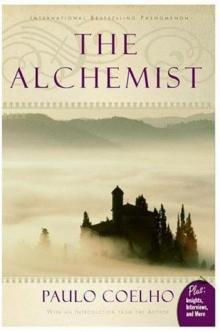 The Alchemist
The Alchemist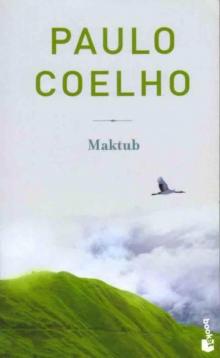 Maktub
Maktub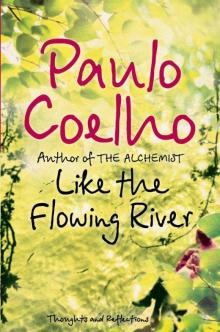 Like the Flowing River
Like the Flowing River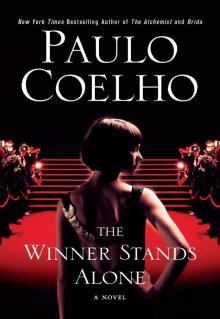 The Winner Stands Alone
The Winner Stands Alone The Spy
The Spy By the River Piedra I Sat Down and Wept: A Novel of Forgiveness
By the River Piedra I Sat Down and Wept: A Novel of Forgiveness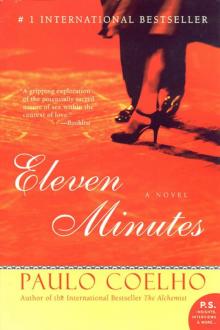 Eleven Minutes
Eleven Minutes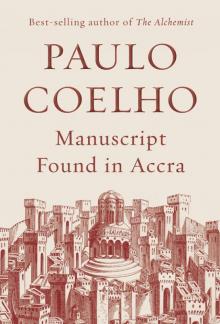 Manuscript Found in Accra
Manuscript Found in Accra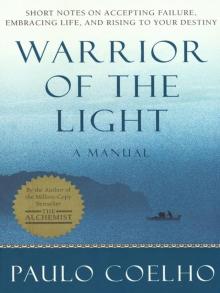 Warrior of the Light
Warrior of the Light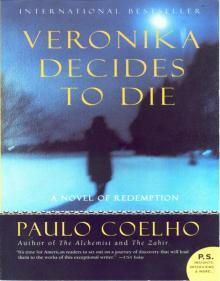 Veronika Decides to Die: A Novel of Redemption
Veronika Decides to Die: A Novel of Redemption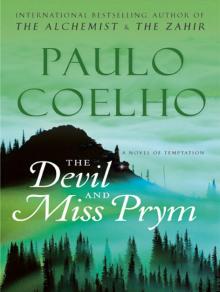 The Devil and Miss Prym: A Novel of Temptation
The Devil and Miss Prym: A Novel of Temptation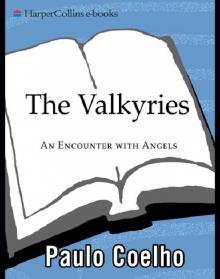 The Valkyries: An Encounter With Angels
The Valkyries: An Encounter With Angels Brida: A Novel
Brida: A Novel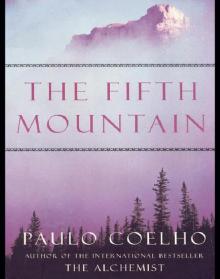 Fifth Mountain: A Novel
Fifth Mountain: A Novel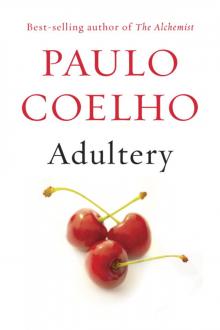 Adultery
Adultery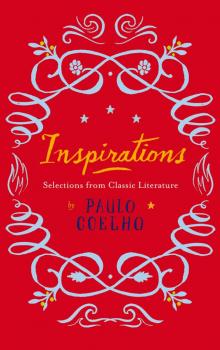 Inspirations
Inspirations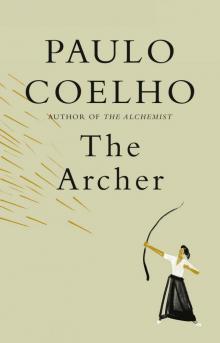 The Archer
The Archer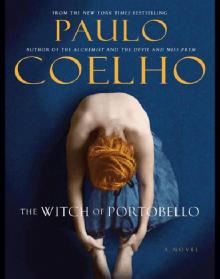 The Witch of Portobello
The Witch of Portobello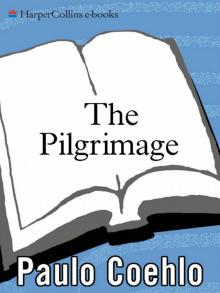 The Pilgrimage
The Pilgrimage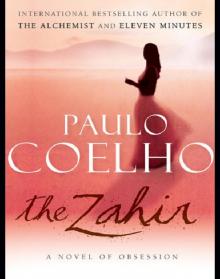 The Zahir
The Zahir Brida
Brida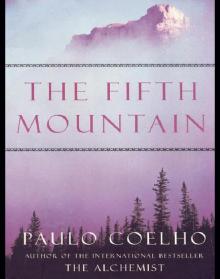 The Fifth Mountain
The Fifth Mountain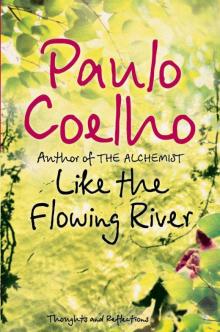 Like the Flowing River: Thoughts and Reflections
Like the Flowing River: Thoughts and Reflections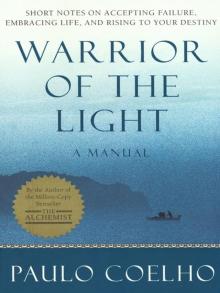 Manual of the Warrior of Light
Manual of the Warrior of Light By The River Piedra I Sat Down & Wept
By The River Piedra I Sat Down & Wept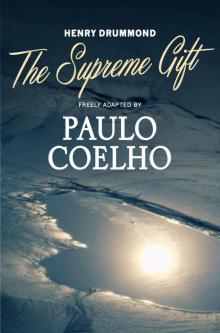 The Supreme Gift
The Supreme Gift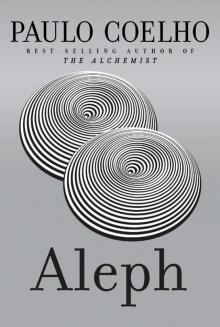 Aleph
Aleph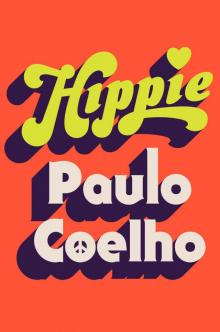 Hippie
Hippie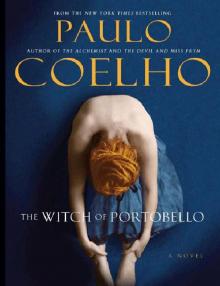 Witch of Portobello
Witch of Portobello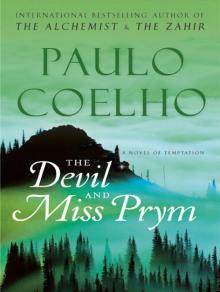 The Devil and Miss Prym
The Devil and Miss Prym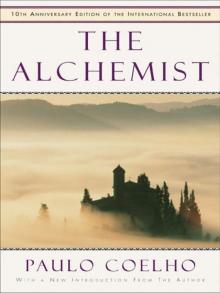 The Alchemist - 10th Anniversary Edition
The Alchemist - 10th Anniversary Edition The Valkyries
The Valkyries